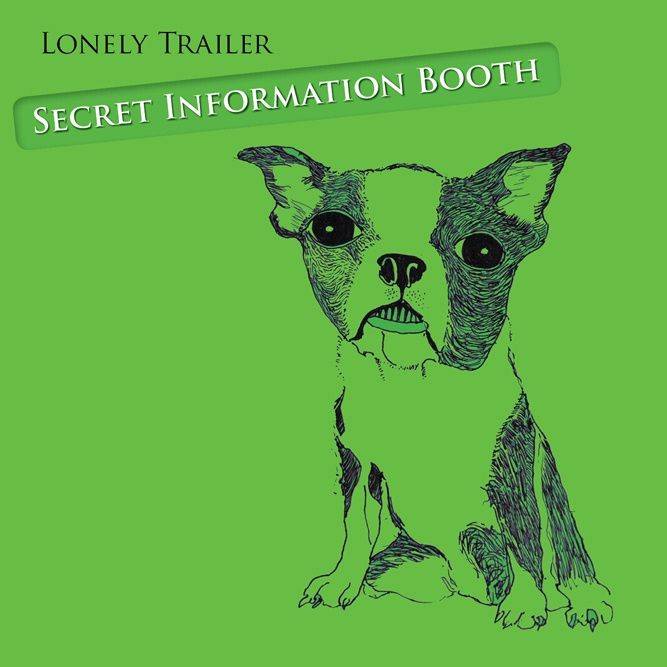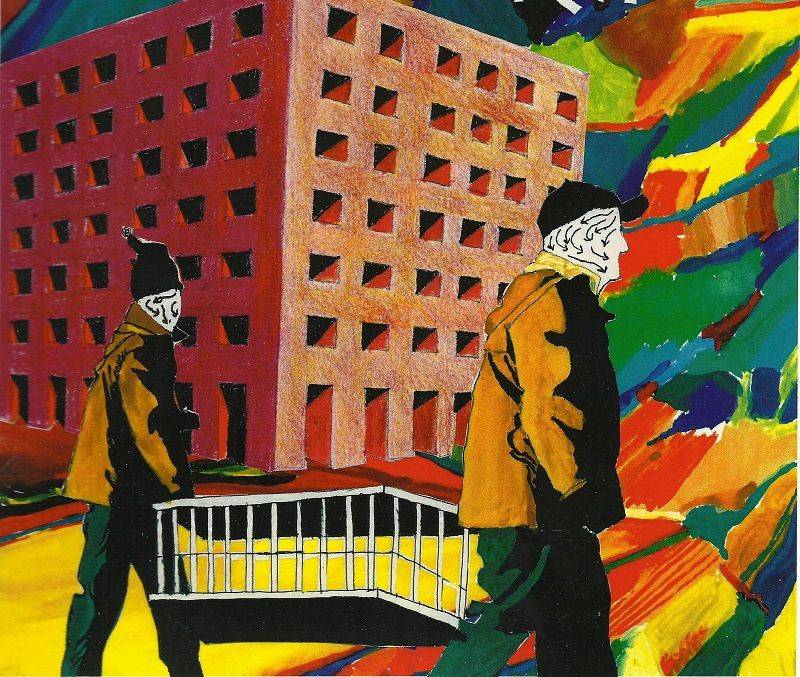You may not have heard, but there’s a local rock band that plays with the same bravado and originality of the Beach Boys and the B-52’s. Since forming over 25 years ago, the guys in Lonely Trailer might seem like an overly seasoned bunch of middle-aged Urbana musicians to the average listener. Yet after a ten-year hiatus, they posses the same passion for composing the most bizarrely written songs that younger bands struggle to hold onto through their first few tours. They’re very self-conscious of how hard it is for their music to fit into the local music scene, but they’re not willing to put down their instruments any time soon. Almost a year ago, they came out with their latest album, Secret Information Booth, which was apparently produced to have each of the fifteen songs to sound completely different, right from the soundboard. One of the songs, “Freaky Weirdo Man”, captures the haphazard creativity of the band in it’s pure gonzo form, with lyrics that were originally written on a typewriter in 1998: “’You keep saying goodbye,’ said time to infinity / Your rejection is cured like the land being burned.”
Lonely Trailer: “Freaky Weird Man”
[[mp3 lonely_trailer_freaky_weird_man]]
On Saturday, they’ll be playing at Thee Deathtower with Acker, Marathon, Cairo and Comfort Food, since playing at Mike ‘N Molly’s last April. I met up with drummer, songwriter, vocalist and lyricist Brian Reedy to talk about the origins of Lonely Trailer, and what they’ve been up to these past few years.
Smile Politey: So what’s the untold story behind Lonely Trailer? How did everyone meet each other?
Brian Reedy: We’re in our 50’s. We’re not younger than the different bands we’ve been playing with lately. For some reason, it seems like they have an appreciation for what we’ve been doing, which we appreciate, because not many people our age are still playing instruments. Other things probably happened, although Tim and Steve both have families. I met Tim back in 1981, and he played in my basement. I was living on a very desperate budget of nothing, really.
But I met Tim back in ’81, and he was in a band called Mode Zero, and they played in our basement. It was hard to appreciate at that time, because I was listening to mostly jazz, and I didn’t understand what they’re doing. I was 18, maybe 19 at the time. But they were good. Then [Tim] was in a band called Caustic. I don’t know how he met Steve Burton, but I met Steve through Tim, because he put out this cassette tape years ago, back when that was the easiest, quickest, least expensive way to put out things.
So Caustic broke up, so we started meeting up at Tim’s house, and we wrote; it’s a group sort of writing. It’s group arrangement. We can arrange things as a group, but I keep writing. I don’t stop. So I got files of probably useless stuff in my brain, so I bring it into rehearsal. A lot of it would be improvised combinations of these thoughts, then started getting it a little bit refined. But we didn’t really want to refine it too much, we wanted it to be kind of blunt, but also a little bit cryptic so that you’re not really sure what we’re talking about.
SP: What inspires all these bizarre concepts and stories behind your songs?
Reedy: Reality, pretty much. There are things that just don’t make a lot of sense, so it becomes myth, for me. I like to have a little bit of information; I don’t wanna know everything. I want just enough for it to be mysterious. I’ve pretty much lived my life that way, which is ridiculous, and a lot of people think that’s probably pretty stupid. But I can’t help it, that’s the way I feel comfortable. I can’t imagine any other way, at this point.
SP: Where do you come up with so much material for songwriting? Just sheer hard work and perseverance?
Reedy: I write a lot, I try to do very limited editing. I feel most connected to the unconscious or the subconscious, I think it offers more than the conscious mind at least. If I’m in public, I’d rather have a conscious mind, if I have to get along or understand [others]. But then I take that back and then I have to put it in a different frame of mind, like unconscious or something that’s not so obtrusive. I’m more comfortable that way. We all bring things in, the whole idea is to encourage everyone to write. That way, everyone is thinking and you have more to work with.
SP: WIthin your band, how do you work as a team? Is there a certain mentality?
Reedy: We’re not very selective. We’ll shape and form until we’re happy with it. There’s some material that doesn’t last, it just happens naturally. We’ll play it a couple times, it’s not relevant or whatever, and we’ll slowly replace it with new material as we come up with it.

SP: What kind of response are you hoping to receive from your listeners?
Reedy: Other than curiosity, maybe the inspiration to pick up a banjo or whatever. To be inspired to continue what we do. That would be the nicest thing. The thing is, it’s not exclusive. I feel like the whole thing is more inclusive, but what happens is then you have commerce coming in. Then you have people who are like, “It’s not worthwhile if we’re not making any money. We haven’t made any money, we’ve been doing this for a long time”. There are people who really question our intelligence, but I don’t care. It’s like trying to write on an unconscious level about things that are kind of real, but you put them through that process of not understanding it, not recognizing it. It’s disorienting, and I don’t know why I like that. Because, I kind of walk around in a little bit of disbelief, other than the natural things I see, like the ground, the sky and everything that comes with it. But everything else seems so manufactured from me, and so removed from the reality that I’d like to have, which is basically just out in the woods somewhere. But this stuff, it seems like it’s just generated by greed.
SP: Do any of your songs make references to pop culture? For example, is “Jimmy, You’re Not A Werewolf” a jab at Twilight?
Reedy: No, no, it’s about my friend Jimmy, I grew up with him. In second or third grade, he was always dropped off at Luane’s down the street from where we lived, so we walked to school together. One time he told me that his father was a werewolf. Then I said your father isn’t a werewolf, and knocked me down and started beating the living shit out of me! I was like, “We’ll he’s still not a werewolf”, and he said that he was a werewolf too.
SP: How do you mix this attitude of unconscious music with the structure of popular rock music?
Reedy: Musically there’s a dissonance, and a lot of people, when they hear that, they hear it as a wrong note. But it’s not necessary a wrong note, it’s dissonance, it’s a clashing of two notes that some people think create a different harmony. We use stuff like that to emphasize different parts of the lyrics, and it’s kind of subtle, but it doesn’t always come through that way.
SP: Is there a greater meaning or subtext to Secret Information Booth, that you could perhaps shed some light on?
Reedy: For me anyways, I feel that there is a secret information booth somewhere, and it’s being kept from us. With that information would be the kind of freedom that would destroy what’s set up now. But that’s not gonna happen. But slowly, we find these things out, like through the Freedom of Information Act. We’re not necessarily limited by our own means. But the funny thing is, I did this poster, with these two guys [on it], and their faces are just these weather patterns with all these arrows, and they’re carrying this empty cage. That’s the secret information booth!








